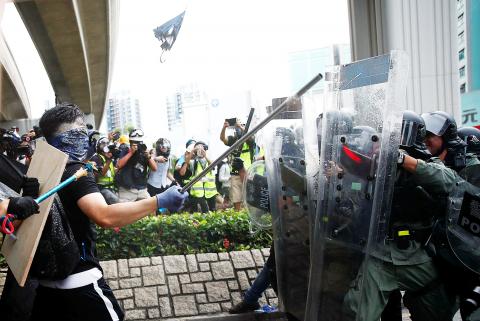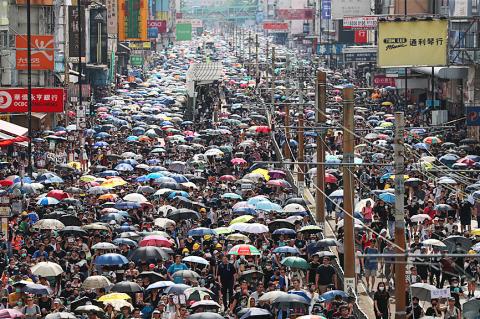Hong Kong police yesterday fired tear gas at protesters holding a banned rally against suspected triad gangs who beat up pro-democracy demonstrators near the Chinese border on Sunday last week.
Riot police fired dozens of rounds of tear gas in Yuen Long after tense standoffs with protesters, some of whom were throwing projectiles and had surrounded a police van.
Public anger has been raging since Sunday, when a gang of men in white T-shirts, armed with poles and batons, set upon protesters and bystanders in Yuen Long Station.

Photo: Reuters
Police have been heavily criticized for being too slow to respond to Sunday’s violence, fueling accusations of collusion or turning a blind eye — allegations the force has denied.
Yesterday’s violence compounds the political crisis with the territory’s pro-Beijing leadership seemingly unable — or unwilling — to end the chaos.
Yuen Long is in Hong Kong’s New Territories, a rural area where many of the surrounding villages are known for triad connections and their staunch support for the pro-Beijing establishment.

Photo: EPA-EFE
Police say they have arrested 12 people so far in connection with Sunday’s violence, nine of whom have known triad links.
The white shirt mob ran into two villages near Yuen Long MTR Station after their attack and later left without police making any arrests, despite a large presence of officers.
These two villages became the focus of protester anger yesterday.
The rally began peacefully, but small groups, many in helmets and carrying shields, confronted police outside the villages and accused them of protecting triads.
Tensions soon escalated with projectiles hurled and a police van containing officers surrounded and daubed in graffiti.
Soon tear gas rounds were arcing through the air and a now-familiar pattern of running battles between police and protesters began.
Throughout the afternoon protesters formed shield walls of umbrellas, scattering each time new volleys of tear gas came their way.
In a rare move, police banned the rally, saying that they feared reprisal attacks against villagers from protesters, a decision that only heightened anger toward a force already perceived to be protecting pro-government aggressors.
Social messaging channels used to organize the largely leaderless movement quickly filled up with calls for people to have a “shopping spree” in Yuen Long or play Pokemon Go there.
Crowds spilled out of Yuen Long’s main station in the afternoon as the illegal march began peacefully. Many shops were shuttered.
“Every one of us came here on our own initiation,” a 25-year-old medical worker surnamed Ng said. “So I don’t think this is an illegal assembly. I’ve just come here as an individual to tell people my thoughts.”
Weeks of protests with huge turnouts have had little luck persuading Beijing or Hong Kong’s leaders. Beijing has issued increasingly shrill condemnations, but has left it to the territory’s government to deal with the situation.
Hong Kong Chief Executive Carrie Lam (林鄭月娥) has shown no sign of backing down beyond agreeing to suspend the extradition bill.
Protesters also plan to march today through a district where riot police fired tear gas and rubber bullets at projectile-hurling protesters the week before.
Police have allowed a rally to take place, but denied protesters permission to march, raising the likelihood of further confrontations.

OPTIMISTIC: The DGBAS sharply upgraded its GDP growth estimate from 3.54 percent to 7.71 percent after the Taiwan-US trade agreement signing and given AI optimism The US imported more from Taiwan than China for the first time in decades, as US President Donald Trump’s tariffs reshape trade flows while a global boom in artificial intelligence (AI) fuels demand for tech products. US purchases of goods from China plunged almost 44 percent in December last year from 2024 to US$21.1 billion, US Department of Commerce data showed on Thursday. By contrast, shipments from Taiwan more than doubled during the same period to US$24.7 billion. The soaring Taiwanese shipments to the US reflect the huge expansion in supplies of chips and servers for AI companies, which has completely changed

NON-NEGOTIABLE: The US president’s action ran counter to one of the US’ ‘six assurances’ on not consulting China about arms sales to Taiwan, US lawmakers said US President Donald Trump’s admission that he is discussing arms sales to Taiwan with Chinese President Xi Jinping (習近平) is “alarming and a blatant violation of US policy and the six assurances,” US Representative Ro Khanna said on Tuesday. Trump on Monday said he would decide soon on whether to send more weapons to Taiwan, after Xi warned him not to do so. “I’m talking to him about it. We had a good conversation, and we’ll make a determination pretty soon,” Trump told reporters aboard Air Force One when asked about warnings raised by Beijing during a phone call with Xi over

The Central Election Commission has amended election and recall regulations to require elected office candidates to provide proof that they have no Chinese citizenship, a Cabinet report said. The commission on Oct. 29 last year revised the Measures for the Permission of Family-based Residence, Long-term Residence and Settlement of People from the Mainland Area in the Taiwan Area (大陸地區人民在台灣地區依親居留長期居留或定居許可辦法), the Executive Yuan said in a report it submitted to the legislature for review. The revision requires Chinese citizens applying for permanent residency to submit notarial documents showing that they have lost their Chinese household record and have renounced — or have never

US and Chinese fighter jets briefly faced off above waters near the Korean Peninsula this week, Yonhap News agency reported, marking a rare confrontation in that area between the two superpowers. About 10 US fighter jets on Wednesday departed an airbase in Pyeongtaek, South Korea, for drills above international waters off South Korea’s western coast, the news outlet cited unidentified military sources as saying. While the US planes did not enter China’s air defense identification zone, Beijing scrambled planes as they neared that region, the report said. “The Chinese People’s Liberation Army organized naval and air forces to monitor and effectively respond